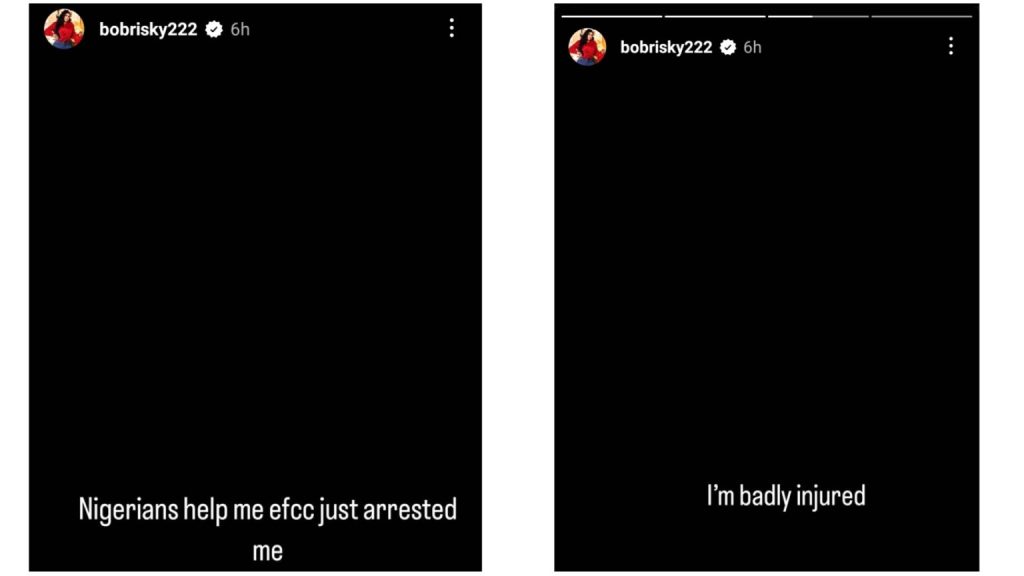Controversial social media personality Bobrisky has reportedly been detained by the Economic and Financial Crimes Commission (EFCC) for the second time in recent days, marking an escalation in the ongoing legal saga surrounding the self-proclaimed “Mummy of Lagos.” The arrest, which allegedly occurred at an airport, comes shortly after Bobrisky’s release from an earlier detention by the Nigerian Immigration Service.
The incident has taken a serious turn with Bobrisky’s public plea for help, accompanied by claims of sustaining injuries during the arrest. Through a series of emotional social media posts, the influencer has shared video evidence purportedly documenting these injuries, adding another layer of complexity to an already contentious situation.
This latest detention follows a tumultuous period where Bobrisky was initially held by immigration authorities over allegations of attempting to flee the country amid an ongoing bribery investigation. The quick succession of events – from release to rearrest – has raised questions about the nature and severity of the allegations being investigated.
The timing of this second arrest is particularly noteworthy, coming just as Bobrisky had begun to reassert his public presence through social media. Following his initial release earlier in the week, he had taken to Instagram to showcase a fresh appearance and make bold statements, suggesting a return to his characteristic public persona. However, this brief period of freedom was apparently cut short by the EFCC’s intervention.
The case has garnered significant public interest, not only due to Bobrisky’s celebrity status but also because of the complex web of allegations involving multiple law enforcement agencies. The involvement of both the Immigration Service and EFCC suggests a coordinated effort to address serious concerns about potential flight risk and financial impropriety.
Legal experts following the case note that the multiple arrests within a short timeframe could indicate the presence of separate but related investigations by different agencies. The flight risk allegations, in particular, have added a sense of urgency to the proceedings, potentially explaining the aggressive enforcement approach.
Bobrisky’s public appeal for help, dramatically calling out to “Nigerians” for assistance, represents a significant shift in tone from his usual social media presence. The decision to publicly document alleged injuries and seek public support has transformed what might have been a routine investigation into a matter of public debate about law enforcement practices and celebrity justice.
The social media response to these developments has been mixed, with supporters expressing concern for Bobrisky’s well-being while critics question the authenticity of the claims. The video evidence of alleged injuries has particularly sparked heated discussions about proper procedure during arrests and the treatment of suspects in custody.
This series of events has also highlighted the increasingly complex relationship between social media influence and legal accountability in Nigeria. Bobrisky’s significant online following has turned what might otherwise have been a straightforward legal proceeding into a public spectacle, with each development being scrutinized and debated across social platforms.
The case raises important questions about the intersection of celebrity, law enforcement, and public accountability. The involvement of multiple agencies and the public nature of the proceedings have created a unique situation where private legal matters are being played out in the court of public opinion.
As the situation continues to unfold, legal observers note that the public nature of these developments could potentially impact the investigation’s progress and outcome. The documentation and sharing of alleged injuries during arrest could lead to additional investigations into law enforcement conduct, potentially complicating the original case.
The timing of these events, particularly the airport arrest, suggests that authorities may have ongoing concerns about flight risk, despite Bobrisky’s previous detention. This persistent concern could indicate the serious nature of the underlying investigation that prompted these enforcement actions.
As the Nigerian public continues to follow these developments, the case has evolved beyond a simple celebrity legal matter into a broader discussion about law enforcement practices, public accountability, and the role of social media in shaping narratives around legal proceedings. The outcome of this case could have significant implications for how similar situations are handled in the future, particularly when involving high-profile individuals with substantial social media influence.



